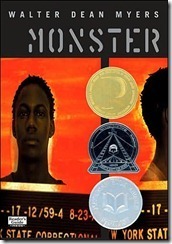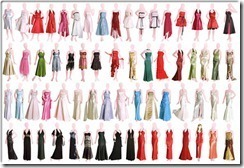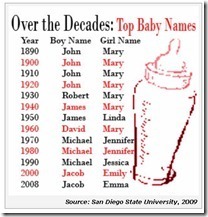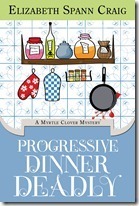Elizabeth Spann Craig's Blog, page 194
August 31, 2011
Keeping Distance Between a Protagonist and a Reader

I just finished reading a book for my book club: Monster by Walter Dean Myers.
The 16 year old protagonist, Steve, is on trial for murder. He's portrayed as a terrified and nearly frantic youth who is trying to make sense of the justice system and what he's experiencing.
Myers used an interesting technique in the story. Steve, an aspiring screenwriter, records his trial in the form of a screenplay…with camera angles, etc., included. The protagonist's reasoning for doing this is that by looking at the process through a lens, he gets a little distance from the events, which calms him a little.
Interspersed with the screenplay is a journal that Steve uses. Readers, I think, need this diary for insights into Steve's thoughts and feelings and to help them relate to the character more.
As a writer, I've worked to get my readers as close as possible to my protagonist—especially in the last two books I've written. I want my readers to see the world through my protagonists' eyes, feel what they feel, and relate to them. I want the characters to be very likeable.
But there are many books with main characters that readers may feel ambivalent about. This was the case with Monster. Is the protagonist guilty or innocent? There was always some distance between myself and Steve. Maybe I knew how the character felt now, but I wasn't privy to all his thoughts—only the ones he recorded. But because the writer had made the protagonist interesting to me, I kept reading to try to learn more about him.
I wasn't even completely sure I believed the protagonist (which was, I think, the author's plan.) So there was a bit of the unreliable narrator going on.
I thought it was an interesting approach—but not one that I'd take with my traditional mysteries. I create flawed protagonists…but I try to make the character flaws things that ordinary readers would relate to.
How close do you let readers get to your protagonist? If you're creating narrative distance, what are you achieving with that effect (for Monster I think it was to create discussion between readers…as I'm sure I'll find at my book club meeting)? As a reader, do you like protagonists that are open books, or characters that you can't quite figure out?
August 30, 2011
Learning Something New? A Few Tips
 I've always heard that it's important to learn something new every day.
I've always heard that it's important to learn something new every day.
But lately, I feel like I've been learning fifty new things a day, trying to keep up with publishing and social media trends.
In many ways, it's wonderful having so much information available out there. If we want to become traditionally published and need to learn how to write a query letter, polish our manuscripts, or pen a pithy synopsis, we can find resources online to help us.
If we want to learn how to self-publish a book, how to format for different platforms, or where to promote a self-published book, we can find that information, too.
This can result in information overload. When I joined a loop for self-publishing info and was encouraged by the moderator to read the archives, I saw a year's worth of information on there. (And, with e-publishing, a year might be outdated. So you also have to decide what's still relevant.)
I started reading the information. I had a moment there, though, when I really didn't want to do it! Now, though, I've learned a lot more about e-publishing.
Here was my method for learning something new:
Know what information you're looking for. It will take even more time if you're just trying to read everything you can on a particular subject (although that's definitely one way of learning something new!) In particular, I was looking for information on different e-publishing platforms, where the e-reading public hangs out online, insights on pricing, and how other writers balance self-publishing with traditional publishing.
Pace yourself. If you've already got a full schedule, cramming a bunch of information in at once is probably just going to lead to burnout. I found myself getting absorbed in the research, so I set a timer. When the timer went off, I stopped reading up on the subject. I've got lots of other things I need to do. Or, if you're putting off your research on the topic, setting a timer for 15 minutes (or whatever your allotted time is) is a great way to remind yourself that you don't have to study for very long.
Jot down anything you don't understand. Sometimes I run across mentions of loops, groups, forums, and sites that I wasn't familiar with. I also ran into some formatting terminology I didn't know. I make notes of things to look up later.
Remember that you can contact primary sources for information. Anytime I've asked a writer or industry professional a question, I've always gotten an informative response back. If you have questions about something, email an expert.
If you have to take a break from learning the skill, make a date on the calendar for picking it back up. Because learning is time-consuming…and it would be so easy to just let it slide.
Don't try to catch up with everyone else. Just jump in and start learning. No catching up is necessary. Again, pace yourself.
Keep a Word file of the most useful information. It's sort of like having your own reference file.
Learned anything new lately? Got any tips? And—do you ever feel like you're overloaded with information and resources?
August 29, 2011
Writing to Read Aloud
 I frequently hear about the quiet life of writing and wonder if I'm just the weird writer in the group.
I frequently hear about the quiet life of writing and wonder if I'm just the weird writer in the group.
Writing, for me, isn't really a quiet, still, activity.
For one thing, I'm frequently charging around the house doing housework when I'm brainstorming ideas.
I get lots of ideas when I'm driving, too.
And when I write, I'm frequently talking. Yes, that's me, talking quietly to myself at the neighborhood coffeehouse. Here's why:
My dialogue sounds more realistic if I've given it a read-aloud test.
I'll check for pace sometimes when reading aloud. Is it choppy enough for an action scene (okay, I'm not writing car chases in my books, but I do have an action scene in each of my mysteries). If something is reading slow, is that because it's the calm-before-the-storm? Or have I written something boring?
Humor. For some reason, I always like to read humorous scenes out loud. Maybe that's from watching I Love Lucy when I was a kid—I think of comedy in performance terms and want to see how my humorous scenes sound.
Problem scenes. If I'm done with my first draft, I'll move on to a quick reread of the book. When I run into a scene that isn't working for me, I'll usually read it out loud. This usually helps me pin down the source of the problem.
Overall editing. If I've just written a book and I'm getting close to a deadline and don't have time to let the book sit for a while, I'll start editing immediately…and I'll read aloud while doing it. For me, it's one of the best ways to create distance from the text enough to catch basic errors.
Sometimes, I'll get hoarse while reading to myself. I've discovered a neat function on my Kindle that might work for short periods of time (and I might be the last writer on the planet to use this, but I thought I'd mention it here.)
I've uploaded my drafts on my Kindle (not published them there, but uploaded them from my computer by dragging a .txt file copy of my Word document to my Kindle when it's plugged into my laptop). And…there's a cool 'read aloud' feature on the device that allows the Kindle to read to me. This will help me out for short spates when I've gotten hoarse.
Do you talk to yourself as you write or edit?
August 28, 2011
Find Readers Through Blog Tours By Kim Wright
![Your_Path_Cover[1]](https://i.gr-assets.com/images/S/compressed.photo.goodreads.com/hostedimages/1380460641i/2689217.jpg) Blog Tours – A Low-Cost, Low-Stress and Actually Fun Way to Help Your Book Find Readers
Blog Tours – A Low-Cost, Low-Stress and Actually Fun Way to Help Your Book Find Readers I had never heard of a blog tour until my novel Love in Mid Air came out last year. My publicist at Grand Central simply said "We're going to send you on a blog tour."
The truth is that the conventional book tour – where an author travels from city to city reading and signing at bookstores - is essentially dead. Only the most established of authors still do them, certainly not newbies like me. And it's actually a good thing that they're dead, since they're expensive for the publisher and almost always demoralizing for the writer.
I have a friend who once flew cross-country to San Francisco to read to six people and every writer who's ever been on a book tour has their own personal horror story about the time they sat on a folding chair for three hours, smiling hopefully at every person who came through the door, and in the end sold one book. To the mother of a bookstore employee who felt sorry for them.
So if the old model no longer works, what's emerged to take its place? Enter the blog tour. Cheap, productive, and relatively painless.
It works like this. In the modern era, a lot of readers buy their books off the internet and look to internet experts, most likely bloggers, to alert them to new titles worth reading. If you can get your book featured on a blog which has lots of followers – especially followers who are interested in the type of book you write – this can result in more exposure than a conventional book tour.
Blogs throw the net wide - across the country and internationally - and they almost always provide a link where an interested reader can immediately buy your book. This creates more sales than a review in a newspaper, which requires the potential customer to read the review, remember the book and author name, and then either go to the computer or a local bookstore to find it. Trust me, the click-and-buy-while-it's-fresh-on-your-mind model is how a lot of books get sold.
My publicist set me up to be on ten blogs a day for the first ten days my book was available. That meant a hundred blogs would blast out something about my book during a two week period – a review, a Q&A between the blogger and me, a guest post I had written in advance. It idea is that a wave of publicity from different sources creates buzz for a launch.
One my publicist pitched me to the bloggers, I connected with all of them several weeks in advance of the launch. We did the interviews, supplied the advanced reader copies, and I wrote any posts they requested. Once the blog tour began, I checked in on the participating blogs several times a day to answer questions and interact with people who'd left comments. And since bloggers frequently post their reviews to sites like Amazon and Goodreads, Love in Mid Air began its commercial life with strong sales and a nice cushion of thoughtful, professionally written reviews.
It took a little time for me to write the guest blog posts that were requested and to check in on the days they ran, but far less time than it would have taken me to drive or fly around the country on a conventional tour. And if there was negative feedback or the occasional nutcase reader – as there always is – at least I didn't have to deal with them face-to-face.
Tragically, my publicist left my publisher before the launch of the paperback a year later, but by then I understood how it worked and was able to create my own Son of Blog Tour. Of the one hundred bloggers she had introduced me to for the hardback tour I had noticed that about half of them were the most helpful – resulting in the most hits and comments. So I trimmed my list down to the blogs that were simpatico with my book and added a few others I'd found on my own in the year between the hardback and paperback launch. Then, a few months before the paperback launch I contacted them and offered content. Bloggers have to write a lot and are usually happy to have a writer offer up a guest post. I created a list of ten or so topics I'd be happy to write on and invited them to take their pick.
You can do the same. If you have a book coming out, and no publicist to help you, simply follow these steps.
1. Months in advance begin to look for blogs aimed towards writers and readers, especially those who feature the kind of books you've written. If your book is gritty urban fantasy, it does you little good to appear on a website devoted to Regency romances.
2. When you find websites you like, poke around them for links to similar websites. Many bloggers have lists of other blogs they like and birds of a feather really do flock together.
3. Simultaneously begin to build up your own Twitter lists and Facebook friends. Once your blog posts go live you'll want to be able to get the word out as far and wide as possible.
4. A couple of months before your launch, begin to contact the bloggers. Offer them a copy for review, offer yourself up for an interview, or offer to write a guest post on a topic that will be of interest to their readers.
5. Send in the content, along with a jpeg picture of you, the cover of your book, and a link to a site that sells your book well in advance.
6. On the day your blog post goes live, announce this on Facebook and tweet it throughout the day. Check in on a regular basis to interact with people who have left comments. If someone writes an especially astute comment, friend them on Facebook or start following them on Twitter.
7. Check your Amazon figures, or whatever seller you've chosen, throughout the day to see if the blog is helping create a bump in sales. Knowing which blogs work best for you will help with further publicity efforts down the road.
8. When it's all over, write a thank you note to the blogger. These people are the unsung heroes or modern book publicity.
See? It's really not that hard and the best news of all is that it's fun. It links you to people who have similar interests, who read and write the same sorts of things that you enjoy. Writing can be an isolated and lonely business and the blog tour can be a great way to pull yourself into a thriving, interactive, online community. As well as selling books along the way.
![MCP_8800[1]](https://i.gr-assets.com/images/S/compressed.photo.goodreads.com/hostedimages/1380460641i/2689218.jpg) Kim Wright has been a journalist for more than thirty years, and is both an award-winning travel writer and novelist. Her nonfiction guide,
Your Path to Publication
, is available from Press 53. It covers all the things writers need to know
Kim Wright has been a journalist for more than thirty years, and is both an award-winning travel writer and novelist. Her nonfiction guide,
Your Path to Publication
, is available from Press 53. It covers all the things writers need to know
after they finish their books – networking and social media, getting an agent,contracts, working with editors, marketing, and the ups and downs of self-publishing. Kim's
novel,
Love in Mid Air
, is available in bookstores and on Amazon.She is presently at work on a mystery about Jack the Ripper.
August 27, 2011
Twitterific
![Terry3_thumb[1]](https://i.gr-assets.com/images/S/compressed.photo.goodreads.com/hostedimages/1380447585i/1701687.png)
 Below are the writing-related links I tweeted last week.
Below are the writing-related links I tweeted last week. The Writer's Knowledge Base search engine, designed by software engineer and writer Mike Fleming, makes all these links searchable—try it for searches on plotting, characterization, querying, book promo, and more. Sign up for the free monthly WKB newsletter for the web's best links and interviews: http://bit.ly/gx7hg1 .
I'm compiling a directory of ebook professionals—cover designers, formatters, freelance editors, etc.—to make it easier for writers to connect with services. If you'd like to be added, please email me at elizabethspanncraig (at) gmail (dot) com with your contact info, website, etc. The directory can be accessed here.
I released an ebook last week. Progressive Dinner Deadly is a Myrtle Clover mystery and is currently available for $2.99 on Kindle and Nook. Hope you'll mention it to any friends who enjoy mysteries.
Hiding clues with humor: http://bit.ly/okk6Pj @HP4Writers
Why You Should Write First for Yourself: http://bit.ly/nrbKLd
How Intuition Can Enhance Your Writing: http://bit.ly/r2R8v4 @TheCreativePenn
Pushing Past the OK Plateau: http://bit.ly/r7WcYk
What top-earning authors make: http://bit.ly/qsTlXl
Why query letters matter: http://bit.ly/q8IVOe @tawnafenske
Breaking In To Publication: Short Stories vs. Novels: http://bit.ly/qtNcNe
Are You A 10,000 Words A Day Writer? http://bit.ly/pOcymC
3 Ways to Write for Yourself: http://bit.ly/p13quD
A directory to help connect writers to cover designers, editors, and formatters: http://bit.ly/qP3ai6
Striking the proper tone: http://bit.ly/qUD3mQ @Mommy_Authors
How to Hire an Editor: http://bit.ly/mZcpJv
The next Writer's KB newsletter features an interview w/ Terry Odell & the month's favorite posts. Sign up for free at http://bit.ly/gx7hg1
How to increase your chances of meeting with an agent at a convention: http://bit.ly/obd2wG
Are Agents & Publishers Too Picky? http://bit.ly/rd8GDC
Is "They" Acceptable as a Singular Pronoun? http://bit.ly/qUVCS8
Describing Characters: http://bit.ly/pG08RN
2 different career arcs for writers: the Genius and the Late Bloomer: http://bit.ly/nZFfnX
A lesson in backstory: http://bit.ly/nFsYjl
Poor sales can affect your future: http://bit.ly/rqMnxA
An agent talks about pen names: http://bit.ly/nArcJ5
Search my tweets-- http://dld.bz/KPgS
How to avoid creating plastic characters: http://bit.ly/nVMajk @JodyHedlund
4 great ways to use Evernote with Skitch today — plus 14 new possibilities: http://bit.ly/oaSGBh @awsamuel
Lost Interest in Writing Your Novel? How to Love Your Characters: http://bit.ly/qLc1oE
Creative Writing Program Rankings Released: http://bit.ly/qmQEO8 @galleycat
Snipping Your Novel's Reviews for Social Media: http://bit.ly/nDRRrn
How to Build a Book Group Audience for Your Book: http://bit.ly/nkCMEf
10 tips for a good interview--as both interviewer and subject: http://bit.ly/oxgog1
Common sense and the writer: http://bit.ly/o5H94d
5 Simple Font Changes to Boost Readers, Comments, and Shares on Your Blog: http://bit.ly/qre5on
Twisting the Tropes in Historical Romance: http://bit.ly/or1MIp
James Patterson brand makes him world's best-paid writer (Guardian): http://bit.ly/nEu5aZ
The Business of #Screenwriting: They will pigeonhole you (and why this can be a good thing): http://bit.ly/ru33ir
Writing Dystopian Noir Fiction: http://bit.ly/nGkqUc
10 Science Fiction Books That Changed the Course of History: http://on.io9.com/oqd3VP
How to Eschew Obfuscation & Write Clearly: http://bit.ly/nVO1ZY
Critical reading means criticizing your reading: http://bit.ly/rfLy07
10 Words Editors Hate: http://bit.ly/o4ZSxl
The Top 10 Books That Influenced J.R.R. Tolkien: http://bit.ly/pZRxyH
A Degree to Write? http://bit.ly/pvzLaO
12 essentials for a successful author website: http://bit.ly/nWCAWL
Stop making excuses and start writing now: http://bit.ly/nGMsKj @fuelyourwriting
How to Use Skype to Sell Books: http://bit.ly/phYOBu @BookMarketer
8 tips to Make Your Next Writers Conference Awesome: http://bit.ly/qUHv9t
Tips for removing narrative distance & tightening POV: http://bit.ly/nmltKr @bluemaven
How to start a blog post: http://bit.ly/nFGP7M @SeanPlatt
Thoughts and tips for naming characters: http://bit.ly/mQZN8w
How to Make Your Reader Cry: Anatomy of a Death Scene: http://bit.ly/rutXsv @lkblackburne
Tips for personal essay : http://bit.ly/owuuQb
The Nuance of Suspense: http://bit.ly/ocdBcu @JoanSwan
4 Tricks for Improving Your Fiction in One Day: http://bit.ly/ovsSGo @victoriamixon
Tips for perfecting your YA voice: http://bit.ly/n4Yseo
Error-Free Will Come "When Cars Can Drive Themselves": http://bit.ly/oUYjR7
The Fine Art of Choosing A Pen Name: http://bit.ly/ph9mQs
What bloggers can learn from comedians: http://bit.ly/p30huC
Authors, Are You Approachable Online? http://bit.ly/ohUx4j @GoblinWriter
Points to consider if you're a new writer hoping to publish an ebook: http://bit.ly/rtDtAg
An agent reminds writers to be team players: http://bit.ly/nqrqhF
Why Authors Should Be Writing in Adobe InDesign: http://bit.ly/nIFzqu
Facebook for Bloggers: A Short Guide: http://bit.ly/n4PKDM
Are you master of your book promotion or just a serf? http://bit.ly/qRO0Gu
How Much Do Book Designers Earn? http://bit.ly/npir6i @galleycat
A writer predicts 10 ebook trends: http://bit.ly/mXLdBo
8 Tips for Using Quotes and Dialogue in Your Blog Posts: http://bit.ly/pqUtWS
A deadly sin of writing--POV prostitution: http://bit.ly/nh5dfs
Plot your revision: http://bit.ly/npgiOc @HowToWriteShop
An agent's thoughts on lessons in picture books: http://bit.ly/pTOqV4
Convert Your PDFs into Clean Kindle or ePub Files: http://bit.ly/oIlNKN @galleycat
3 ways to toughen up wimpy characters: http://bit.ly/oUzdfN @JulieMusil
5 Brainstorming Strategies for Writers: http://bit.ly/oEEALd
101 of the Best Fiction Writing Tips: http://bit.ly/qmWUVl @writeitsideways
An agent explains what happens if your book doesn't sell: http://bit.ly/qO1Aa1
How to Build a First-Class Email List in 30 Days — from Scratch: http://bit.ly/oFg4vT
Tips for reading blogs and leaving meaningful comments: http://bit.ly/rowO3A
5 more techniques to help you ratchet up the tension and conflict in your story: http://bit.ly/oAQpbR @jhansenwrites
Organization for Creative People – Why Your Brain May Be Keeping You From 'Getting Things Done': http://bit.ly/nCvJK0
How to Use Journaling Therapy to Know and Grow Your Life: http://bit.ly/quUxtT
How to Tantalize as a Graphic Novel: http://bit.ly/oCNT2h
Writing Life: Reassessing Goals For the Year: http://bit.ly/mWZ7zh
Outlining As You Write: http://bit.ly/oIUCxT
How to Make Your Blog Readers Into Rabid Fans: http://bit.ly/p6XuRj
Why 1 writer isn't a fan of fan fic: http://bit.ly/oMJgYQ
How to Treat Names of Groups and Organizations in Your : http://bit.ly/q4MA7A
A fight scene formula (to avoid): http://bit.ly/qbc0VL
5 steps to better proofreading: http://bit.ly/q74GPH @woodwardkaren
Scammers want *you*: http://bit.ly/nuzMQf
How to give book teasers for an upcoming release: http://bit.ly/qGjbT5 @cherylktardif
How to Throw a Book Party that Rocks: http://bit.ly/pN6dkZ
10 Things You Need to Know About Virtual Book Tours: http://bit.ly/pfthMv @nouveauwriter
Crime Writers: Hostage Situations from the Police Negotiator's Perspective: http://bit.ly/npR6ij
An agent on author advances (& whether there's such a thing as too much): http://bit.ly/rfex4V
Should You Pitch (and Sign With) a New Agent? The Pros and Cons: http://bit.ly/riZkuN
7 Easy Steps to Much Faster Writing: http://bit.ly/ruK9RJ
The Latest E-Book Buying Trends (Publishers Weekly): http://bit.ly/pl9xHw
Are books dead, and can authors survive? (The Guardian): http://bit.ly/pjbjoH
Writing and Publishing E-Books for Charity: http://bit.ly/q9TFqy
Need help with pacing? http://bit.ly/gbXFZH
Pros of different types of settings: http://bit.ly/n20xTe
Why Copying Inspires Creativity: http://bit.ly/qB9BVp
For crime fiction writers--how burn phones work: http://bit.ly/nYzaTC @ClarissaDraper
An agent reminds us to meet our deadlines: http://bit.ly/qS3Ebt
The Dangers of Inadequate Writing Time: http://bit.ly/nzgWeK
How Booksellers Can Fight Censorship During Banned Books Week: http://bit.ly/qs8lBK
Crime fiction sleuths who get push-back from family & friends for investigating: http://bit.ly/p1jf1F @mkinberg
What 1 writer learned over summer vacation: http://bit.ly/owqxic @BTMargins
How getting dissed by a literary giant gave 1 writer confidence: http://bit.ly/nshTqS @PennyJars
7 Rules for Identifying People by Place Names: http://bit.ly/rl9z1n
How to build a villain: http://bit.ly/rssK56 @woodwardkaren
How to Satisfy Your Reader without Being Predictable: http://bit.ly/mZ7Ir1 @victoriastrauss
Why authors should start a newsletter: http://bit.ly/pCuzxj
When to re-query an agent: http://bit.ly/ovEtKm
13 things that go into a book proposal: http://bit.ly/pEurt3
On author photos: http://bit.ly/qzmS7p
Tips for plumping up wispy book middles: http://bit.ly/qul3Fm
How to Deal with Unconstructive Criticism: http://bit.ly/q8yxkN
Who has the power in #publishing? http://bit.ly/oSuT51
Best Articles This Week for Writers 8/26/11: http://bit.ly/pMPFvK @4kidlit
Plagiarism: Is It Safe to Share Your Writing With Others? http://bit.ly/oPlaNJ @meghancward
The death of the book tour: http://bit.ly/rrULY1 @AnneRAllen
Preparing to meet agents and editors: http://bit.ly/ogCvea
Don't just think about it---send out those queries: http://bit.ly/o9H9WU
Character flaws from virtues: http://bit.ly/mQaOxo
When you need backstory and when you don't: http://bit.ly/oNiLL7
Regrets and What They Say About Your Character: http://bit.ly/ruzmbG @jeanniecampbell
The Difficulty of Finding Story Ideas That Publishers Like: http://bit.ly/qKVfTW @jodyhedlund
10 Tips for Attacking First Drafts: http://bit.ly/rrcUBt @elspethwrites
Lost the Ability to Write? How Writers Get Their Grooves: http://bit.ly/nUwicY
Outlining a Novel - Step By Step: http://bit.ly/p9SRX4
Captain America's 10-Step Guide to the Likable Hero: http://bit.ly/qH3V1D @KMWeiland
Top 10 Tips of Writing 1 Writer Learned from Studying JK Rowling: http://bit.ly/pDLGuo @HP4Writers
Dialogue as a weapon: http://bit.ly/oaFDwb
Librarians Reshelve 27,000 Books After Virginia Earthquake: http://bit.ly/ouM2bl @galleycat
9 tips to set and achieve creative goals: http://bit.ly/pZZtta
How to deal with people: Advice for the shy & socially awkward: http://bit.ly/oJF3o3
Using the 3-Act Structure: Adjusting Expectations: http://bit.ly/pxRgsP
$99 Tablet from Amazon? http://bit.ly/qwhbLX @PassiveVoiceBlg
3 Lessons Learned While Backpacking Europe: http://bit.ly/mYh6te @YAHighway
Playing To Your Strengths as a Writer: http://bit.ly/nBO71x @jhansenwrites @GeneLempp
Formatting red flags: http://bit.ly/isBR78 @WriteAngleBlog
Work for hire arrangements in publishing: http://bit.ly/r8m5nw
The units that make up a plot: http://bit.ly/pjJsrR
Conflict vs. complication: http://bit.ly/o8lZSF @tabithaolson
6 dialogue traps to avoid: http://bit.ly/odnGlT @indieauthor
Should I meet writers, or write (or blog)? The writer's dual identity: http://bit.ly/quxh0Z @JulietteWade
A Book's Success (or Failure) Depends On A Lot Of Variables, Reminds an Agent: http://bit.ly/o0A0cw
Sword Swallowing: Put Your Emotion On The Page: http://bit.ly/nv3wm7
Real Life Diagnostics: Getting Emotional: http://bit.ly/pTIb2J
What "Cowboys and Aliens" Can Teach us About Connecting to Readers: http://bit.ly/oBUlFR @Janice_Hardy
Creative Goal Setting for Writers: http://bit.ly/mQCbBA
3 Things That Come First Before You Tackle Social Media: http://bit.ly/nGuvec @JaneFriedman
Your Characters Should Exist in Time: http://bit.ly/qnjCfh
Why writers need to be able to ask for help: http://bit.ly/q1MqO1 @JodyHedlund
August 26, 2011
Knowing Our Writing Weaknesses
 My friends are, generally, nice people, but they do laugh at one particular handicap I have.
My friends are, generally, nice people, but they do laugh at one particular handicap I have.
I can't for the life of me describe anything to do with fashion.
For a teenage girl it was fairly crippling. "Elizabeth, what are you wearing to Cotillion?"
I'd pause. "It's blue."
You can imagine the tittering that followed. :)
When my bridesmaids asked me what types of dresses they'd be wearing, I said, "They're pretty inexpensive. They're sundresses."
It wasn't what they'd asked. I did notice that when they were describing their own Cotillion dresses or wedding gowns or bridesmaids dresses, they'd use terms like "tea length," and "V-neck" and "tulle."
I don't care much about fashion, and it's pretty obvious. :)
I'm not writing catalog copy (thank goodness), but I am writing books that women will read. And I know many women like at least some sort of an idea what characters are wearing. Plus, clothing can be an indicator as to a person's profession or give some insights into them as a character (I'm wincing wondering what my clothes say about me…).
So I've spent a good deal of time reading ad copy and catalog copy for clothing companies.
I've also gone to paint store sites to read their descriptions of color and texture.
I've visited curtain manufacturer websites, oriental rug websites…you name it. I've tried to get a feel for descriptive language from people who use it to sell products.
There are also sites like The Bookshelf Muse which help connect writers with descriptive terms for colors and textures.
The important thing, I think, is knowing where our writing weaknesses lie. Because there are so many ways we can learn how to overcome them.
Got any writing weaknesses? How are you addressing them?
August 25, 2011
Not in the Mood to Write? Write According to Your Mood
 I've noticed in the past that my mood influences my writing.
I've noticed in the past that my mood influences my writing.
It's been a really busy last few days, as I mentioned yesterday. I'm trying to take things a little slower now and plan some of my day ahead of time.
But it's still busy. And that, unfortunately, makes me cranky. I don't really like to be busy. But busy is a way of life for me.
I noticed my crankiness coming through a character a couple of days ago. The scene involved a neighbor's visit and was intended to be a springboard to set up a murder.
My protagonist, though, didn't want to be visited. She wanted to be very still and drink herbal tea. She was decidedly grouchy when she answered the door and ungracious during the course of the visit. And she wasn't supposed to be!
I stopped writing the scene and worked on another part of the book—a section where there was real tension in the room and the characters were all angry with each other.
I could write tension and conflict perfectly. :)
Some books I've written straight through from start to finish. If I run into a block, though, or if the writing gets too close to me (because I don't write myself into books) , it's better to just open another Word document, save it under a scene description, and write the scene I'm in the mood to write.
Fortunately, most books have as many different types of scenes as there are moods.
Sometimes I'm in a really peppy, lighthearted mood and comedy comes easily to me. If I've got excessive amounts of energy, then I'll write an action scene. If I'm not feeling particularly creative, I'll revise a book (I usually have a book I'm revising and one that I'm writing.)
My muse and I have never been on speaking terms. Luckily, I can work around her.
Do you write out of order sometimes? Do you ever feel your mood leaking into your writing?
Scheduling Time to Breathe
 Life is usually pretty fast-paced here. Recently, it's been faster-paced than usual.
Life is usually pretty fast-paced here. Recently, it's been faster-paced than usual.
Today is the first day of school for my children. The last week has been a blur of preparations for school, celebrating a family birthday, and other activities. One of my babies is going to high school today…and I really don't know where the time has gone.
On Tuesday, there was an earthquake in Virginia. The tremors were felt as far away as Georgia.
My dad felt them in South Carolina. "I was reading on the porch," he said. "I felt them for about ten seconds."
I'd been driving at the time, focused on the task so that I could check something else off my list to get to another thing on my list…and then another.
Several other people asked me if I'd felt anything. I think, on Tuesday, the ground would have had to have opened and swallowed me up before I noticed. No, I didn't notice an earthquake. If I felt anything, I probably just attributed it to uneven pavement under the car.
But if I'd been reading on a quiet porch in South Carolina? Sure. I'd have felt them then.
This makes me think that I need to give myself a little more breathing room each day to just observe.
Whenever I'm not running frantically, I've noticed that I get more ideas for my writing. I might get a character idea or a bit of description, or a plot twist. It might even be something big, like an idea for a series.
Although I don't see life getting any quieter in the next couple of weeks (the opposite is true, actually), I think I'm going to get up earlier to get prepared for it all so that maybe I can fit in my breathing space between it all. I usually get up at 5---I think I'm going to make it more like 4:30. And maybe do more list-making the night before I turn in. That way I won't be playing catch-up each day.
How do you fit some quiet time into your day? All ideas welcome. :)
August 23, 2011
Creating an Uncomfortable Situation
I was at a local amusement park with my children last weekend and was put in an uncomfortable situation a couple of times in a row.
We were in the water park when a family took it upon themselves to have a humongous, awful argument about five feet away from me. They were calling each other names (the children as well as the adults), being passive aggressive, being openly aggressive, and being overall very loud. The dad was a bully, the mom was shrill, the teenage son was accusatory. I tried to escape.
Shortly after that, a large lady in an inner tube floated up to me in the shallow area and stayed right there next to me, less than a foot away. I'll admit to having some personal space issues, but I think even someone who doesn't would think that was a little close when the rest of the shallow area had no one in it at all. (The arguing family had moved on to another section of the pool.)
It all made me think about creating discomfort in our books.
Putting our characters in uncomfortable situations can be a way to create humor. It's fun to put a character in an uncomfortable situation and see what happens. My character, Myrtle, gave a disastrous dinner party and she was so serious about trying to make everything perfect. When it all backfired on her, it made the scene funny.
By making our protagonist feel uncomfortable, we can pull our reader into the tension that she's feeling. This will evoke sympathy for our character.
This discomfort can be used as a way to keep readers turning pages….readers want our friendly protagonist to get out of the situation she's in.
Lend a sense of realism to a scene. We've all been in situations where we feel uncomfortable. Readers can relate to it.
Do you like making your characters uncomfortable? How have you done it in the past?
August 22, 2011
Naming Characters
 I usually have a good time naming characters, but I'll admit that sometimes I have to go back and change names later. Or add them.
I usually have a good time naming characters, but I'll admit that sometimes I have to go back and change names later. Or add them.
My editor for the quilting mysteries called me a couple of weeks ago. "Does your victim have a last name?" she asked.
I blinked. Did she? I told my editor I'd email her, then went through the manuscript, searching for it. Nope, she sure didn't. The victim didn't really need one at the time, but my editor needed a last name for the back cover copy. Oddly enough, I did have a last name in my brainstorming notes but it hadn't come into play in the book…I guess I just used it to set the character in my brain when I was drafting.
This kind of last-minute change or addition of names has happened to me before.
One book I submitted needed a character name change in the 11th hour—the name was already taken by a real person…an actual author at another publishing house. We didn't want to step on any toes or make it look like I had a vendetta against that poor author (I didn't even know them, but it would have looked bad.)
Here are some things I've learned about naming:
Not everyone should be named. Bit characters can usually just remain unnamed and just tagged.
We should avoid naming characters names that start with the same letter. I'm editing a book I wrote a long time ago and I'm amazed that I have 3 characters whose names start with B. Really? I'm changing them.
Sometimes character names alone aren't enough to place a character with a reader. A short reminder of who the character is when they come back onstage might be a good idea (especially if they have a smaller role). It's helpful to have a 'Jenny hopped in the car, still wearing her scrubs from work.' Really, you don't even have to be that vague with the reminders: sometimes a 'Jenny, Cameron's sister, got in the car' is fine to slip in. I think this is becoming even more important with ereaders, since it's a bit more of a pain to type in a name to search for it, instead of just flipping (or it is to me, anyway.)
Using nicknames as well as regular names can be tricky unless we make it clear or we're fairly consistent with the nicknames (one character uses it all the time to refer to another character, etc.)
I try to find appropriate names for my characters. Right or wrong, there's definitely baggage that comes along with certain names. If I were going to write a beauty queen, I probably wouldn't choose the name 'Gertrude' unless I was trying to be funny. Trudy, though, might work out well. I wouldn't name my intellectual Biff…again, unless I was trying to make a point. It would be too much work to try to undo the readers' quick leap to stereotype.
Every book I seem to change a character name at least once. After eight chapters, they may not be the same person I thought they were in chapter two. By chapter eighteen, they might have changed again.
Do you enjoy naming characters? Do you always stick with a character name or have you changed them in the past?





